Conference Visits
Georgia Boyd and John Donovan
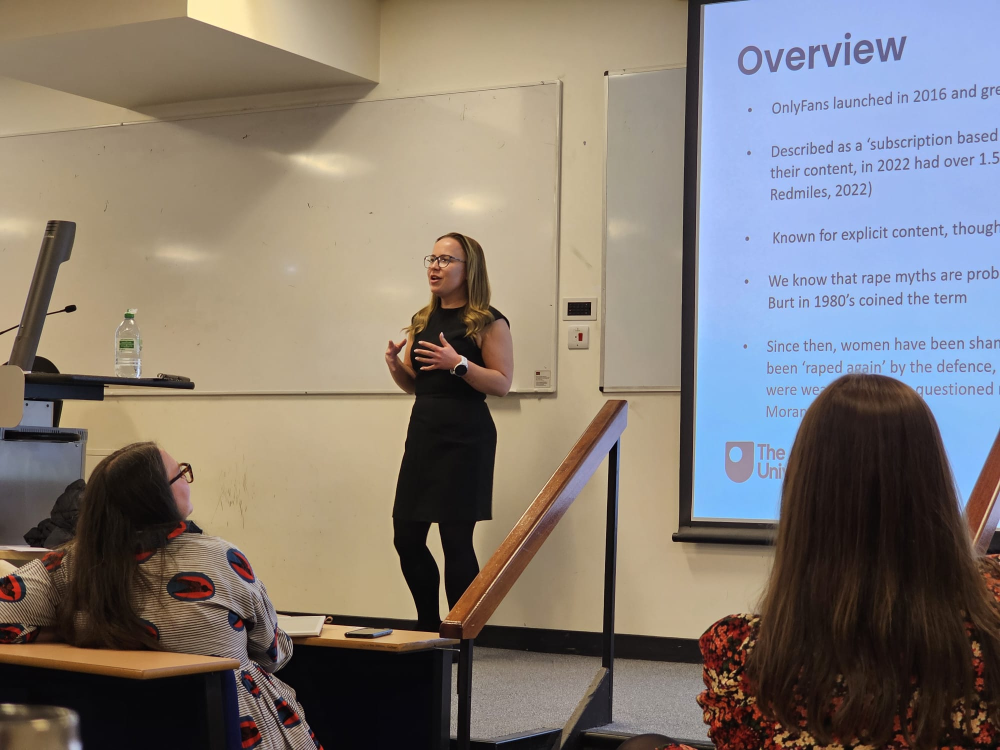
Georgia Boyd (pictured) was among a number of Law School representatives at the Socio-Legal Studies Association (SLSA) annual conference in Liverpool before Easter 2025. She shared findings from her interviews with OnlyFans explicit content creators, conducted to find out how content creators perceive the criminal justice system and courtroom, and how those perceptions are informed by rape myths. She contributed to methodological discussions, too, relating to the use of vignettes in interviews when discussing sensitive topics such as sexual violence.
John Donovan also presented a paper on ‘Bringing outer space governance within the orbit of international environmental law’. The three-day conference coincided with the 36th anniversary of the Hillsborough disaster and the year in which a new Hillsborough Law is anticipated. It opened with a plenary session on the legal legacy of the 1989 football stadium disaster featuring prominent figures in the ‘Hillsborough Justice Campaign’.
John Donovan
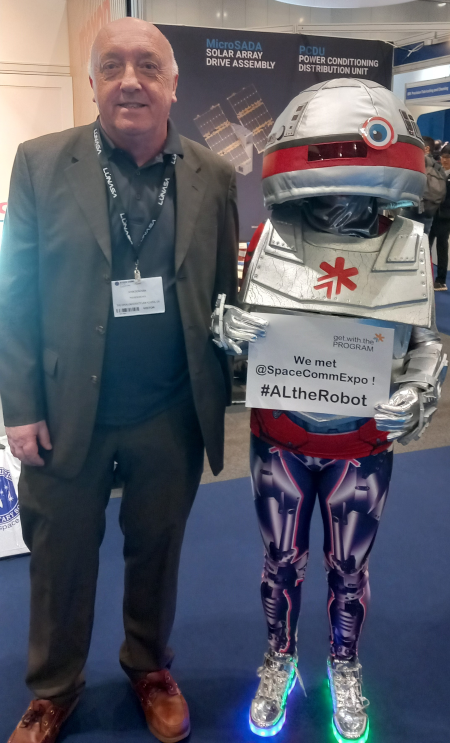
John Donovan (pictured) attended the SpaceComm Expo at the ExCel Centre in London in early March 2025, the UK’s leading event for the space industry with more than 200 exhibitors, 120 speakers and 5,000 attendees. This featured presentations by Prof Brian Cox and Sir Richard Branson (beamed in from his own Necker Island!), while representatives from the UK Space Agency, the European Space Agency, and the United Nations Office for Outer Space Affairs (UNOOSA) gave briefings. John also attended a Space Law Symposium focusing on environmental sustainability and space activities. This was chaired by Alderman Professor Emma Edhem, the Lord Mayor’s Aldermanic Envoy for Space Technology and Innovation (2023-24), City of London Corporation.
Fiona Naysmith and John Donovan

Fiona Naysmith and John Donovan took part in an interdisciplinary symposium on Earth-Space governance in the Netherlands.
Lecturer in Law Dr Marjan Ajevski and Visiting Fellow Dr Thomas Cheney also attended the two-day event hosted by Utrecht University.
The Earth-Space Symposium on ‘Sustainability, Governance, Futures, was on 12-13 November – see more information on the PlanetStewards project which is focused on Earth-Space sustainability.
Yelyzaveta Monastyrova
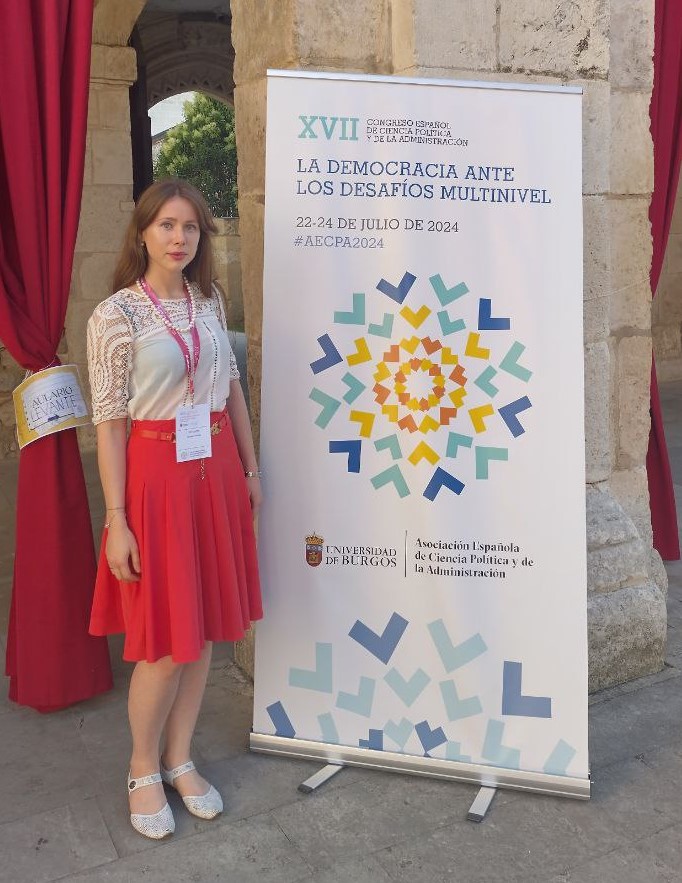
A three-day conference in Estonia at the end of September was an excellent opportunity to share some of the findings from Yelyzaveta Monastyrova’s research on human trafficking in Ukraine.
Her presentation focused on the use of human trafficking conspiracy theories in Russian disinformation campaigns, drawing on the paper recently published in the Journal of Human Trafficking, Enslavement and Conflict-Related Sexual Violence.
The conference, ‘Populism, Conspiracy Theories and the War against Ukraine’, was organised by the University of Tübingen and the University of Tartu in Tallinn.
Previously, Yelyzaveta (pictured) took part in the XVII Congress of the Spanish Political Science and Administration at the University of Burgos from 22-24 July. She presented a paper discussing Spanish legal and policy framework against human trafficking from the perspective of gender equality policies.
Yelyzaveta said: “This was, excitingly, my first presentation in the Spanish language and a perfect place to receive feedback on the case study of anti-trafficking in Spain, as well as a great learning experience.”
John Gynn
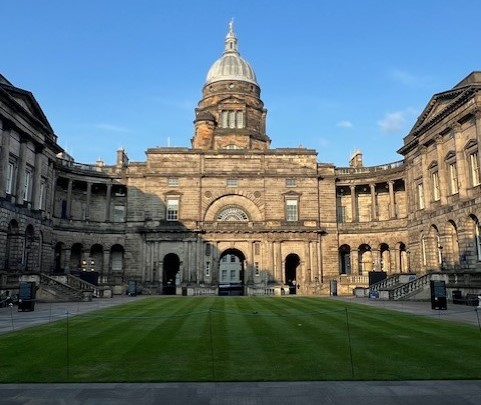
John Gynn attended Edinburgh University’s annual Legal Theory Festival over three days in early June.
This opened with a symposium on Prof Maksymilian del Mar’s biography of Prof Sir Neil MacCormick, illuminating MacCormick’s life vis-à-vis his philosophy. MacCormick’s successor and event organiser, Prof Neil Walker, focused on chapters on nationalism and Europe.
The highlight of the second day was the Annual Jurisprudence Lecture, delivered by Prof José Juan Moreso of Pompeu Fabra University.
John said: “The final day saw stellar contributors who discussed legal drafting and interpretation. This introduced me to the work of esteemed legal scholar Prof Ruth Sullivan. Co-organiser Martin Kelly described Sullivan’s, ‘The Plain Meaning Rule and Other Ways to Cheat at Statutory Interpretation’ (2005), as his favourite article – it may now also be mine.”
Yelyzaveta Monastyrova
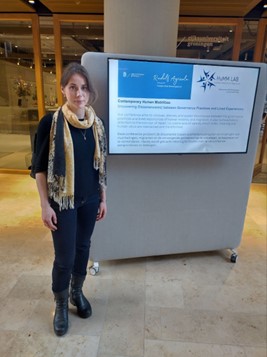
Yelyzaveta Monastyrova took part in the 42nd International Labour Process Conference at the Georg-August-University Göttingen in Germany.
She presented a paper, ‘Exploitation and / as Non-work: Case Studies of Domestic Human Trafficking in Spain, Ukraine and the UK’, at a panel on Violent Exploitation and Slave-like Labour.
The conference, which welcomed more than 350 researchers from 35 countries, provided a forum for fruitful multidisciplinary discussions and mutual learning.
Yelyzaveta (pictured) also presented at the ‘Contemporary human mobilities: uncovering dissonance(s) between governance practices and lived experiences’ conference, hosted by the Human Mobility and Migration Lab at the University of Groningen in the Netherlands. Her paper was on ‘Immobility and Internalisation of Bordering within European Anti-trafficking Regimes’.
The conference offered many inspirational insights with scholars of different aspects of migration and mobility from the law, political and social sciences.
Eight all present and correct in Portsmouth!

Four PhD students were joined by four Law School academics to present aspects of their research in person at the Socio-Legal Studies Association (SLSA) hybrid annual conference at the University of Portsmouth before Easter (26-28 March 2024). The work of the School featured in eight streams during six of the conference’s eight sessions (HMS Warrior is shown, at night, in Portsmouth Harbour).
Dr Fiona MacDonald presented on ‘Comparing State parties after the second UNCRPD review: What can we learn from the Concluding Observations reports?’ in the Disability, Law and Social Justice in Times of Uncertainty stream. At the same time, Fred Motson and Prof Steph Pywell co-presented a paper, ‘Legal consciousness in wedding and ceremony leaders’ responses to the COVID-related restrictions and their removal’, in the New Frontiers in Legal Consciousness Studies stream.
The next morning, Lewis Sibanda presented ‘A Critical Legal Approach to understanding the root causes of human trafficking’ in the Law and Political Economy stream, while Fiona presented her second paper, ‘The interconnection of environmental rights and the child’s right to play’, in the Children’s Rights stream.
Later that day, Dr Neil Graffin presented a paper, co-authored with former colleague Matt Howard (now University of Kent) and PhD graduate Jo Vincett (Liverpool John Moores University), on ‘Control and criminalisation of maritime search and rescue vessels in the Mediterranean’ in the Managing and Protecting People on the Move stream.
In the last panel session before the gala dinner, Yelyzaveta Monastyrova presented ‘Social Rights, Citizenship, and the Status of a Victim of Human Trafficking in Spain, Ukraine and the United Kingdom’ in the Social Rights, Citizenship and the Welfare State stream. At the same time, Conor Logue presented ‘Harmful Online Disinformation and Misinformation (HODAM): Why International Human Rights Law (IHRL) is the Answer’ in the Equality and Human Rights Law stream.
In the conference’s final session, Sahil Mathur presented ‘Digital Exclusion in the Financial Sector: A Comparative Study of India and the UK’ in the Banking and Finance stream.
Gabriel Omachi
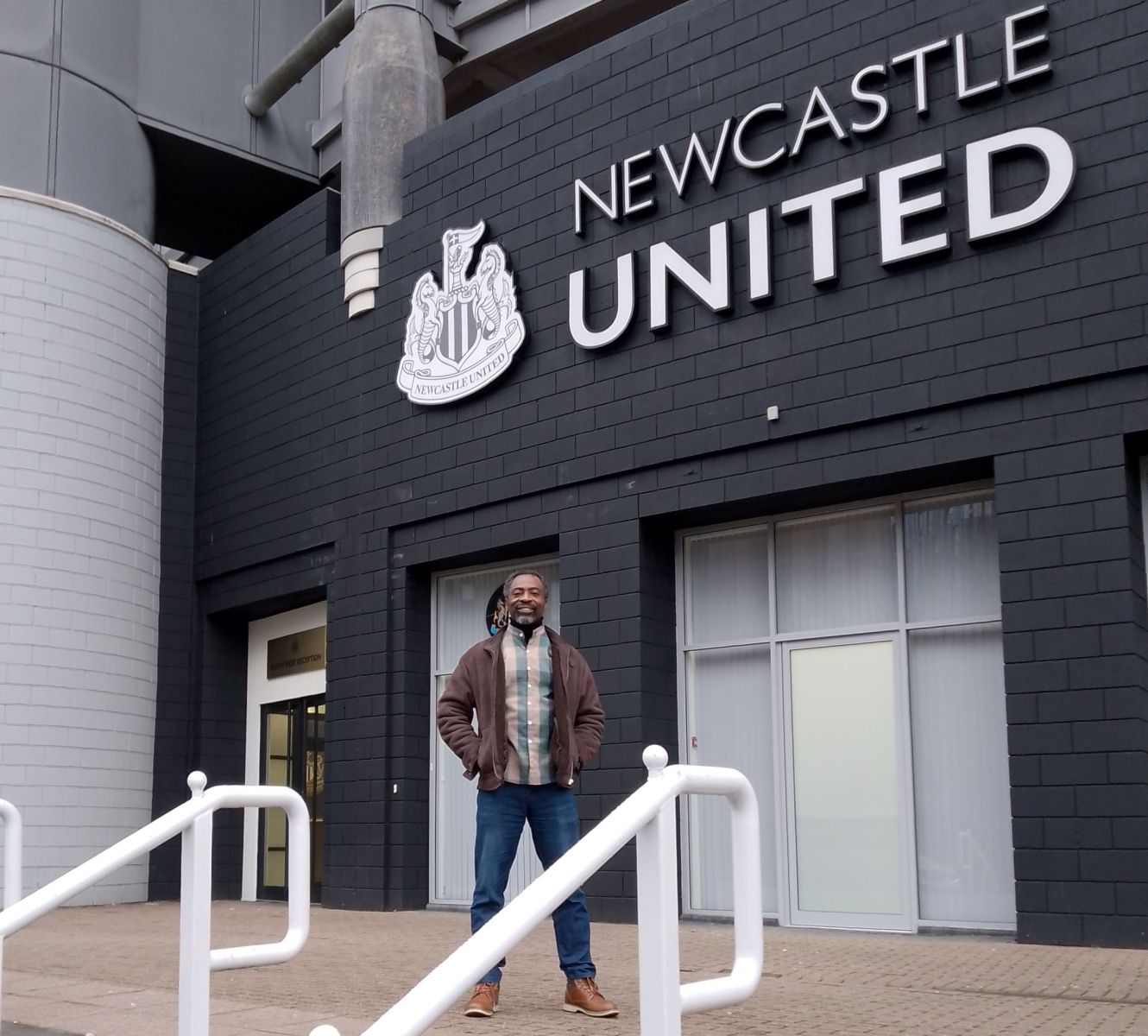
Gabriel Omachi attended the Socio-Legal Studies Association (SLSA) Postgraduate Research Conference in January 2024 at Northumbria University. This annual event is aimed at postgraduate socio-legal researchers and primarily those who are just starting on their research journeys.
He said: “Walking into that conference hall was like entering a legal rock concert. The air crackled with the electricity of ideas. The SLSA conference was a blast and a mind-bending, heart-warming, and game-changing experience for me. We walked away with more knowledge than a legal encyclopedia, and more inspiration than a courtroom speech by a renowned KC (King’s Counsel – a senior trial lawyer)!
“However, it wasn’t just about how to obtain academic prowess and was also a reminder of the human element at the heart of legal scholarship. The social event was great, I made some friends and walked around the city centre including Newcastle United’s St James’ Park stadium (pictured).”
Tiffany Adams
Tiffany Adams attended the Public Procurement Research Students’ biannual conference, hosted by the Public Procurement Research Group at the University of Nottingham, over two days (30 November and 1 December 2023).
She presented her paper, ‘Transparency in Jamaica’s Public Procurement System: Past, Present and Future’, and received feedback from fellow researchers and academics in the field of public procurement from across the continent. This provided
Tiffany, and other public procurement PhD researchers, with the opportunity to garner advice on their respective projects, network and also gain insight into niche areas of public procurement.
Fiona Naysmith
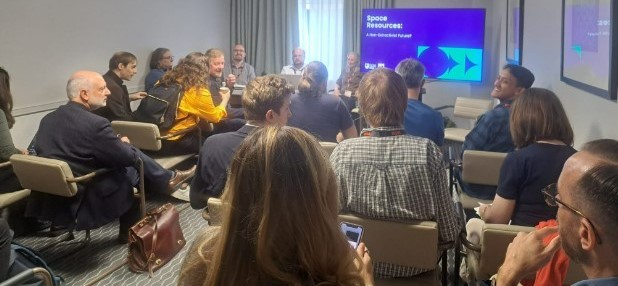
PhD student Fiona Naysmith joined two other members of the OU’s Space Governance team – Dr Thomas Cheney and Dr Marjan Ajevski – on an all-OU panel on ‘Space Resources: A Non-Extractavist Future?’ at this year’s British International Studies Association (BISA) Conference in Scotland.
This was the new Astropolitics Working Group’s inaugural appearance at the well-attended three-day event. It brought together academics from all walks of international studies, by way of specialist working groups, from Gendering International Relations and Russian and Eurasian Security, to Interpretivism and Global Nuclear Order, and of course, Astropolitics from 21-23 June 2023 at the Glasgow Hilton.
The conference which asked ‘What can International Studies contribute to a Summit of the Future?’ produced diverse and innovative answers, alongside spacious seating for networking and a plentiful supply of coffee and pastries!
Fiona said: “Overall, the atmosphere was lively, stimulating and welcoming – a great event for all levels of conference experience, from the fledgling researcher to seasoned academics.”
Alina Kislova (with Jessica Heddenhausen, Mingru Li and Chinedu Nevo)
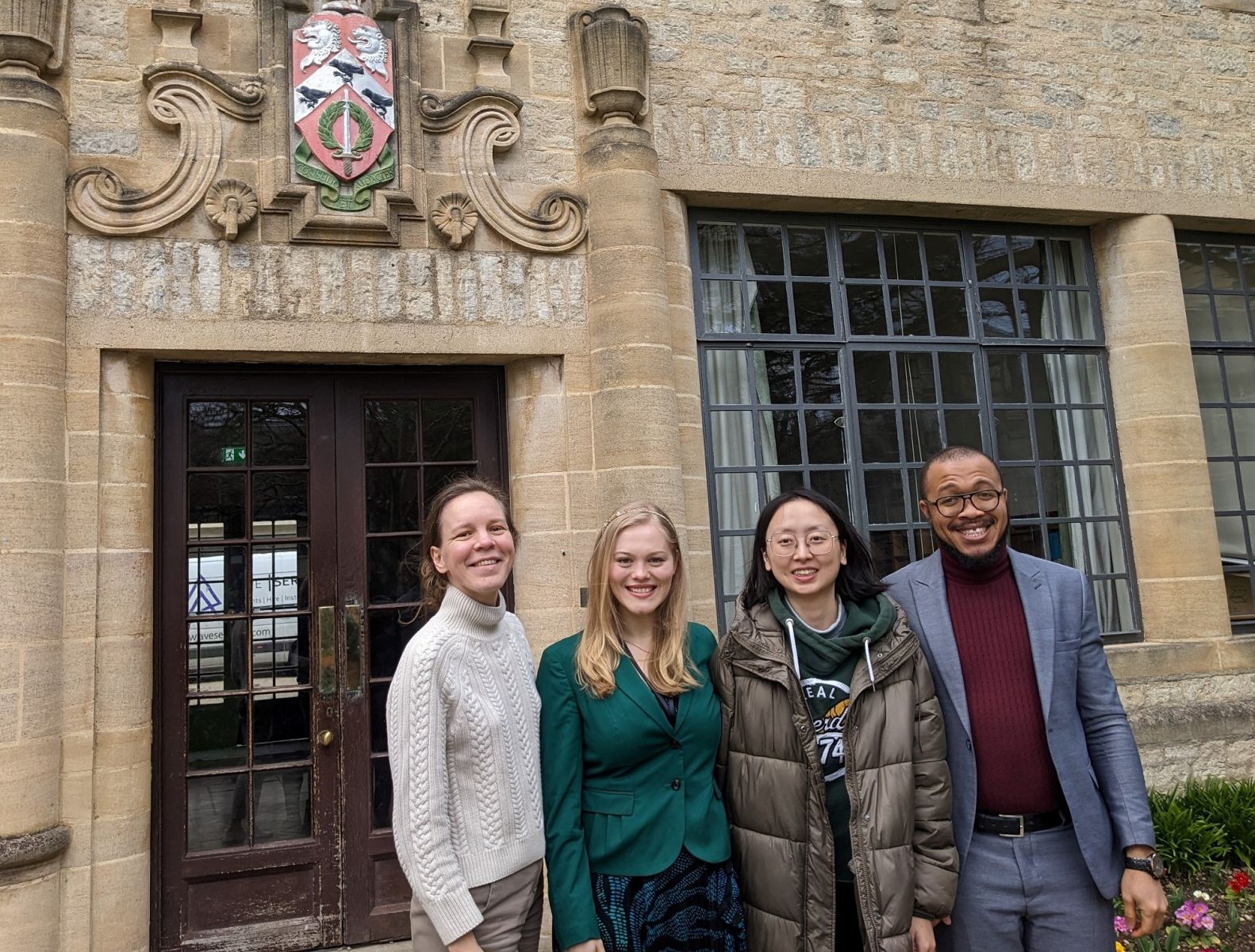
A quartet of our students – Alina Kislova, Jessica Heddenhausen, Mingru Li and Chinedu Nevo (pictured, left to right) – were at the ‘Social Sciences Impact Conference: Hope into Action’ at the University of Oxford’s St Anne’s College in March.
Although each had initially been unaware of the attendance of the others, they soon discovered each other within the close social sciences research community. So not only did the conference discuss the power of (international) research and collaboration, it also demonstrated the social sciences network in action!
Originating from Russia, Germany, China and Nigeria, the students were inspired by the host of cross-country research and international speakers (from Holland, Mexico, Spain and many more) who emphasised the importance of building impact through inclusive research and collaboration between academia, businesses and charities. For example, the University of Oxford works with the Autism Community Research Network Southampton (ACoRNS), investigating the views and experiences of marginalised autistic children and young people within education to reveal opportunities for social improvement.
The themes, ‘Social Sciences Impact’ and ‘Hope into Action’, framed discussions about the ecological impact in low and middle-income countries from the global south (such as issues of safe water), the legal impact of safeguarding children (from sexual exploitation), and the well-being impact of lifelong health and women’s health in the workplace, alongside business solutions that may advance the UN’s Sustainable Development Goals.
Expert panels, case studies, round table discussions, workshops and many more formats showcased the many possibilities for collaboration and knowledge transfer. A panel discussion on policy (particularly applicable to Jessica’s research on sustainable farming) and follow-up networking opportunities empowered the students with tools that will transform their own research into social science impact. Even promotional booths offered access to knowledge transfer partnerships and networks such as Oxentia, a training and consultancy service specialising in social impact from knowledge exchange and commercialisation, with whom the OU has also been involved.
Following the conference, the students walked through the streets of Oxford which reminded them of famous intellectuals, books and movie scenes! They discussed opportunities for collaboration and early career development that they hope will lead to similar impacts to those witnessed at the conference.
Sahil Mathur
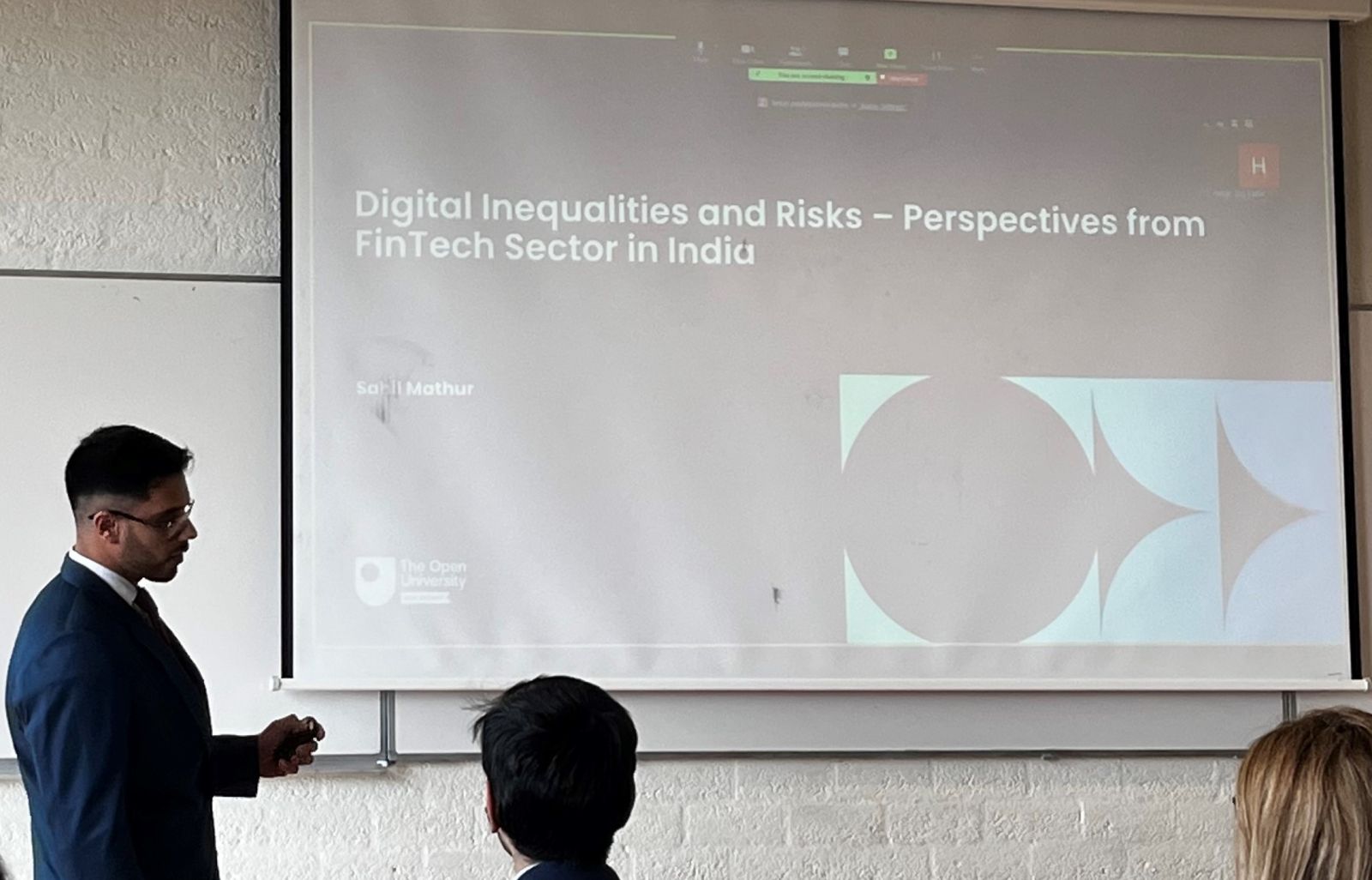
Sahil Mathur was a prize winner at the British and Irish Law Education and Technology Association (BILETA) conference in Amsterdam on Thursday 13 – Friday 14 April.
He was awarded the prestigious Taylor and Francis Prize for his paper, ‘Digital Inequalities and Risks – Perspectives from the FinTech Sector in India’, which included a £250 cash sum. The paper looks at how the gap between financial literacy in India and the growth of the Indian FinTech sector exposes users to various risks of FinTech. It also talks about how the existence of digital inequalities in the FinTech sector in India leads to a lack of financial inclusion.
Sahil (pictured) said: “The Taylor and Francis Prize recognises the exceptional research contributions of BILETA members and is conferred on behalf of the esteemed International Review of Law, Computers and Technology. I’m humbled by the recognition of my research efforts.”
BILETA 2023 had more than 90 physical attendees, plus 40 who joined remotely, across 18 parallel sessions with engaging presentations and animated, thoughtful discussions among the attendees. Both days began with a compelling keynote address, delivered by two eminent scholars – Orly Lobel expounded on the Equality Machine, while Giovanni Sartor discussed the manifold applications of artificial intelligence in the realm of law.
Alina Kislova

More than 300 academics and practitioners working and researching within the area of clinical legal education worldwide come together on a biannual basis to share new developments and practices taking place in their institutions and countries.
In late 2022, this worldwide conference (‘Justice Education: Building Resilience and Strong Connection in Times of Global Challenges’) took place at the Faculty of Law, University of Stellenbosch, in South Africa.
As part of the programme, attendees had an opportunity to participate in various hands-on workshops, masterclasses, mock trials and many other forms of learning exchange activities. There were also social justice visits organised for participants at various local social justice actors, including Night Shelter Stellenbosch, Sustainability Institute, Township and Village Tours, Women on Farms Project and university Law Clinics.
There was also some time to visit and explore historically and biodiverse significant places, such as the Robben Island prison where Nelson Mandela was held for 18 years, the Cape of Good Hope where Atlantic and Indian oceans meet, and much more.
There are also blog posts from two of the Law School’s academics – Liz Hardie and Carol Edwards – about the conference.
